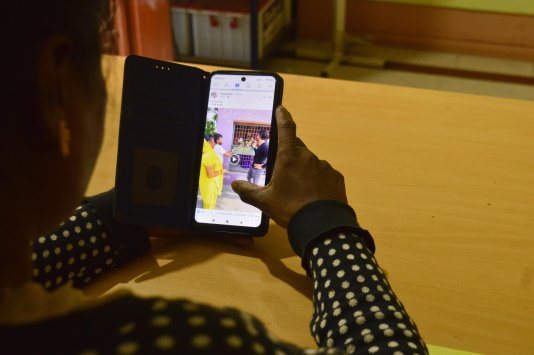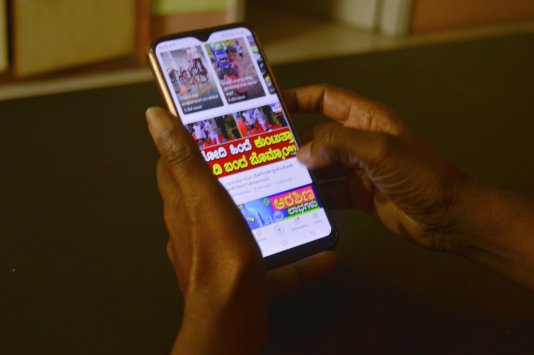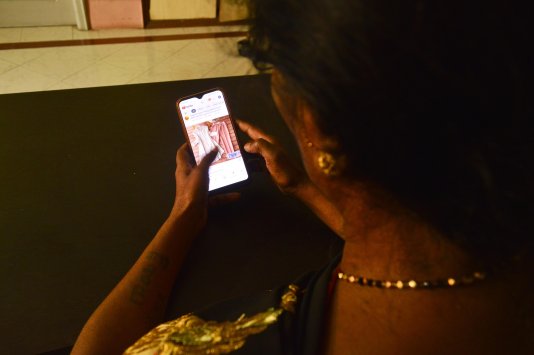- About
- Topics
- Picks
- Audio
- Story
- In-Depth
- Opinion
- News
- Donate
- Signup for our newsletterOur Editors' Best Picks.Send
Read, Debate: Engage.
| December 06, 2022 | |
|---|---|
| topic: | Human Rights |
| tags: | #India, #sex work, #digital literacy, #trans rights |
| located: | India |
| by: | Midhat Fatimah |
With 600 million smartphone users, India, in tandem with the fast-paced internet zeitgeist, is striving to transform itself into "a digitally empowered society and knowledge economy." However, marginalised communities, like that of sex workers, are rarely included in such technological revolutions.
Out of India's 1.2 million female sex workers, there are only 6,88,51 'registered' female sex workers who receive services from the Ministry of Health and Family Welfare. The data suggests the stark exclusion faced by the sex workers community as a whole in the country.
According to a 2020 study by the Centre for Internet and Society, mobile phones were found to be an important resource for accessing social welfare schemes such as those linked with Aadhaar, a biometric document issued by the Indian government.
In 2006, Nandini*, who lives in the southern state of Karnataka, had to part from her children after she contracted HIV from her husband who died of the disease. She now meets her family occasionally.
Clueless about the privacy settings on her smartphone, Nandini’s nightmare of being exposed was materialised when her daughter-in-law came across her ringing phone.
"I had no idea about passwords or phone and app locks," Nandini told FairPlanet. "One day, my daughter-in-law picked up a client’s call on my phone and came to know that I am a sex worker. It led to a lot of tension in the family."
Her inability to read, write or speak English, coupled with digital illiteracy and having a grandson who grabs her smartphone to play video games, meant that Nandini had no sense of privacy.
But in February this year things took a positive turn for her after having learned to navigate her smartphone at a digital training workshop organised by the Solidarity Foundation, a Bengaluru-based NGO that supports sex workers and gender and sexual minorities.
Her smartphone, which previously was only good for making and receiving calls, has now become instrumental in helping Nandini empower her community members.
"I have not only learned to use pattern locks and disappearing messages, but I have also learned to use apps like WhatsApp to share beneficial government schemes, awareness programmes and daily struggles of fellow sex workers," she said.
The same confidence was exhibited by Tasneema*, who became a sex worker after her husband’s death about a decade ago. The 52-year-old single mother attended digital training workshops in 2021 conducted by Sangama, another NGO supporting sex workers in Bengaluru.
Prior to attending the digital training sessions, leading a secret life as a sex worker was difficult for Tasneema, as she used to think her phone might give it away. "I feel a sense of relief - for now I know how to lock my phone," she said, adding, "I always share my location with my friends before going anywhere and also understand the importance of switching off my location."
Tasneema also uses Instagram now; she follows over 200 accounts selling clothes and wishes to learn the nitty-gritty of running an online clothing business.
Kamla*, a sex worker based in Bengaluru who attended digital training workshops by Sangama, says that whenever she comes across a government scheme now, she immediately shares it with the community members on WhatsApp groups.
Nandini, Tasneema and Kamla are not alone. About 1,000 kilometres away from Bengaluru, Sudheer Patil, a 48 year-old trans sex worker based in Mumbai, is also reaping the benefits of their new-found digital savviness.
"Earlier , I used to meet clients in-person, but now I can find clients online as well," said Patil, who in 2016 attended digital training workshops organised by a Mumbai-based NGO called Point of View. "I mostly use apps like Walla, Grindr and Facebook to meet clients, but I am on Twitter too now."
In its effort to facilitate greater participation of sex workers in the digital sphere, workshops by Point of View also train sex workers in creating videos, memes etc. (often through a feminist lens).
"I really enjoyed the session I attended on Zoom during the pandemic wherein I learned how to click photos, shoot videos and record sound," Patil added. "Besides posting for fun, taking better pictures helps us professionally, too, as clients ask for our pictures."
"We found that most people are focusing on gender equality efforts on the ground, but we don’t think it will be enough going forward," Bishakha Datta, Point of View's executive director, told FairPlanet. "So, we are focusing on building gender-equal digital spaces."
The training sessions at Point of View are attended by sex workers of different age groups with varying levels of literacy and are conducted in regional dialects too when necessary. The different training sessions include lessons in digital literacy, digital security and digital rights.
Since 2015, about 2,000 sex workers have attended Point of View's workshops. "We conduct a needs-assessment where sex workers tell us what they would like to learn, and sometimes they also share the problems they face while doing online sex work," Datta said.
Digital literacy enables some sex workers to meet clients online, which can improve their safety as they are able to avoid risky encounters with goons and the police. Prostitution is not illegal in India, but some related activities - including solicitation of sex work - are considered unlawful; this often enables police officers to harass and extort sex workers.
In workshops focusing on digital security, sex workers learn how to set passwords, delete their browsing history and manage location settings and spam downloads, among other things.
Sex workers are also taught how they can provide their services online safely and discreetly without falling prey to non-consensual recording and documentation of the sessions, said Datta; she added, though, that these tactics have their limitations.
The findings of a 2019 study about the use of mobile phones by female sex workers highlighted the issue of "non-consensual photography and videography by clients and strangers."
"Once, my Facebook account got hacked," Patil from Mumbai recalled. "The hacker impersonated me and started sharing my pictures with my clients and friends - so I sought help from the trainers at Point of View,"
"There are some new dangers that come with mobile phones," Shubha Chako, the Solidarity Foundation's executive director, told FairPlanet. "It is now easier for the police to track sex workers and find out their details."
But despite these new challenges, Datta said that sex workers generally gain more confidence after receiving digital trainings.
This story was written and produced as part of a media skills development programme delivered by the Thomson Reuters Foundation. The content is the sole responsibility of the author and publisher.
*Names have been changed to protect the interviewees' identity.
This article has been updated on 6.12.2022.
Image by Midhat Fatimah.
By copying the embed code below, you agree to adhere to our republishing guidelines.



